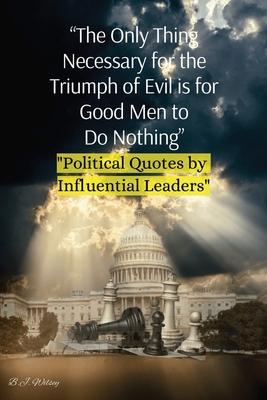"The Only Thing Necessary for the Triumph of Evil is for Good Men to Do Nothing" An Examination of Political Quotes
This profound quote, often attributed to Edmund Burke, serves as a powerful reminder of the importance of active moral engagement in the face of injustice. This quote encapsulates a timeless principle that transcends political and historical boundaries, emphasizing the vital role that individuals play in maintaining a just society.
At its core, this quote speaks to the consequences of inaction in the face of wrongdoing. It suggests that the perpetuation of evil or injustice is not merely a result of malevolent forces but also of the passive acceptance or indifference of those who are morally upright. Inaction, in this context, is not neutral; it implicitly endorses the status quo and allows harmful practices or regimes to flourish unchecked. This idea has resonated across various historical periods, from the horrors of totalitarian regimes to the more subtle forms of systemic discrimination and corruption.
Political quotes like this often serve as clarion calls for vigilance and activism. They remind us that democracy and justice are not automatic; they require the active participation of citizens who are willing to stand against unethical practices and advocate for change. The quote encourages individuals to be proactive in their moral and civic responsibilities, reinforcing that silence and passivity in the face of evil can be as damaging as the actions of the perpetrators themselves.
Moreover, this quote is a call to collective action. It underscores the necessity for communities and societies to remain engaged and responsive. It challenges each person to consider their role in the broader social and political landscape and to contribute to the fight against injustice. By doing so, they ensure that the values of fairness, equality, and righteousness are upheld.
In summary, the statement "The only thing necessary for the triumph of evil is for good men to do nothing" serves as a powerful and enduring exhortation for moral courage and active engagement. It highlights the crucial role that each individual plays in preventing the rise of evil and maintaining the principles of justice and equity in society.
"Within the pages of this book, we embark on a compelling journey through the annals of political history, where the words and wisdom of some of the most influential figures of the past century have been meticulously curated. From the eloquence of Franklin Delano Roosevelt to the vision of John F. Kennedy, the indomitable spirit of Sir Winston Churchill to the moral clarity of Abraham Lincoln, and the passion of Martin Luther King Jr. to the resilience of Nelson Mandela, this collection of political quotes offers a glimpse into the minds of those who shaped the course of nations.
Mahatma Gandhi's philosophy of nonviolence, Albert Einstein's reflections on the human condition, and George Orwell's warning against the perils of authoritarianism are all part of this rich tapestry. We also delve into the timeless insights of John Emerich Edward Dalberg-Acton, 1st Baron Acton, whose wisdom on power and its potential for corruption remains as relevant today as it was in the past.
These quotes, drawn from public speeches, writings, and historical records, serve as a testament to the enduring power of words to inspire, provoke thought, and ignite change. As we embark on this literary journey, we invite you to explore the profound insights and enduring wisdom encapsulated within these pages, shedding light on the complex, ever-evolving world of politics."
